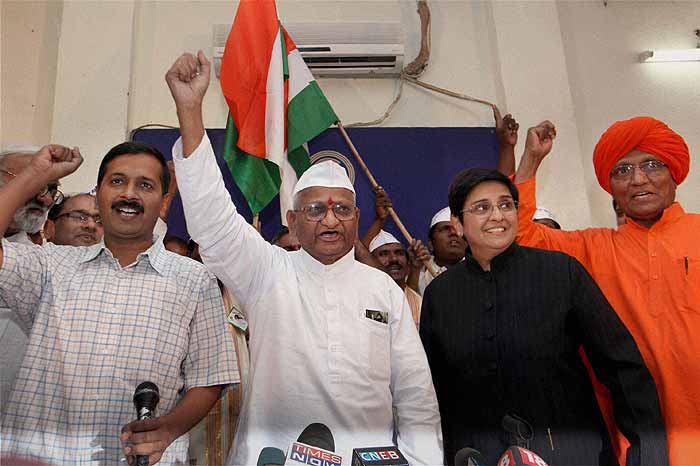Anti-Corruption, Anti-Democratic

Or so goes Kapil Komireddi's assessment of a disturbing movement among understandably exasperated middle-class Indians:
An unusual revolution is underway in India. Over the past 10 days a 74-year-old former soldier and social activist called Kisan Baburao Hazare has been on hunger strike, threatening to starve to death if an anti-corruption bill drafted by his team is not voted into law by parliament. The law would create an anti-corruption agency, Jan Lokpal - a constitution-subverting supercommittee of 11 citizens vested with sweeping powers over the executive, legislature and judiciary. India's new middle class, exhausted by the contrast between its own rapid economic rise and the slow moving democratic politics of the country at large, passionately backs it. The mainstream television and print media, which cater primarily to the middle class, bestow endless coverage on it.
...
And yet, despite the pervasiveness of graft, questions abound over the wisdom of Hazare's demand. Is it, for a start, a smart idea to create a bureaucratic colossus to take on corruption caused in large part by a colossal bureaucracy? Why must we presume that the Jan Lokpal would be incorruptible? Hazare and his associates - who have branded themselves Team Anna - are easily exasperated by questions. Invited by the government to talk, their side of the negotiation ends up amounting to a reiteration of their demand: if you don't pass the bill, Anna Hazare will kill himself. How about we get the parliamentary standing committee to scrutinise it, asks the government. Hazare will die if you do, replies Team Anna. In desperation the government makes an offer: we'll try to pass the bill, but how about we make some changes - keep parliament, which is the elected sovereign of India, outside the scope of the Jan Lokpal? Anna will die, comes the answer.
Unanswerable to parliament, above the constitution, beyond the traditional checks and balances of democracy, and its incorruptibility apparently secure because its functionaries would be drawn primarily from a pool of distinguished prizewinners, the Jan Lokpal is a crystallisation of the emergent Indian middle class's yearning for a benign dictatorship.

